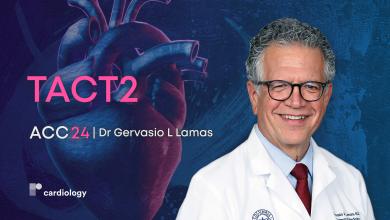Search results
Author(s):
Maki Komiyama
,
Koji Hasegawa
Added:
3 years ago
Type 2 diabetes is a major risk factor for the development of cardiovascular disease (CVD) such as MI, and cerebrovascular incidents such as stroke. A substantial body of evidence has indicated that the proper management of blood glucose in people with diabetes can inhibit the progression of microvascular disease such as retinopathy and nephropathy.
Nevertheless, whether strict blood glucose…
View more
Author(s):
Domenic A Sica
Added:
3 years ago
Introduction
Diabetes mellitus is rapidly increasing in its worldwide prevalence and is currently estimated to affect 7-8% of the US population.1 In 2005, 1.5 million new cases of diabetes were diagnosed in people aged 20 years or older in the US. In the not-so- distant past, type-2 diabetes mellitus was viewed as a seemingly benign condition, at least in the elderly, with little effect on life…
View more
Inflammation in Diabetes
Author(s):
Sotirios Tsalamandris
,
Alexios S Antonopoulos
,
Evangelos Oikonomou
,
et al
Added:
3 years ago
Article
ACC.24: The TACT2 Trial
Author(s):
Gervasio L Lamas
Added:
1 week ago
Video
Author(s):
Cecilia Low Wang
Added:
2 years ago
Dr Cecilia Low Wang (Colorado Prevention Center, US) discusses the findings from the VOYAGER PAD - rivaroxaban in symptomatic PAD with and without comorbid diabetes study. The study assessed the efficacy and safety of rivaroxaban in patients with PAD with concomitant diabetes after lower extremity revascularization.
The study presented at ESC Congress 2021 showed that the efficacy of rivaroxaban…
View more
Author(s):
Su Down
Added:
3 years ago
This programme has been created with a view to educate primary care healthcare professionals in the UK to understand when, and for whom, they should prescribe SGLT2 inhibitors and to understand the latest advancements in this drug class.
Boehringer Ingelheim Ltd has supported this event as a Medical Education Grant and has had no other involvement in the organisation or the delivery of…
View more
Author(s):
Steven E Nissen
Added:
1 year ago
EASD 22 - Dr Steven Nissen (Cleveland Clinic, US) joins us to discuss the findings of the SURMOUNT-MMO trial. This study aimed to evaluate the effect of tirzepatide in type II diabetes patients who have obesity, or are overweight.
Questions:
1. What was the rationale behind this study?
2. What is the mechanism of action of Tirzepatide?
3. What was the study design?
4. What were the main outcomes…
View more
Author(s):
Carl Streed
Added:
6 months ago
EASD 2023 – Dr Carl G Streed (Boston University School of Medicine, US) joins us to summarise healthcare disparities among the LGBTQ+ population.In this interview, Dr Streed discusses the available evidence and explains the minority stress model. This model suggests that experiences of discrimination and stress contribute to worse health outcomes in the LGBTQ community. This can lead to mental…
View more
Author(s):
Mikhail Kosiborod
Added:
1 week ago
ACC.24 — We are joined onsite by Dr Mikhail Kosiborod (Saint Luke’s Mid America Heart Institute, US) to discuss the findings from the STEP HFpEF DM Trial (NCT04916470).The STEP HFpEF DM study aimed to investigate the effect of taking semaglutide 2.4mg once weekly in patients with heart failure with preserved ejection fraction (HFpEF) and diabetes mellitus type 2. The study looked at the impact of…
View more
Managing Cardiovascular Risk in Patients with Type 2 Diabetes - Challenges and Opportunities
Author(s):
Lars Rydén
,
Linda Mellbin
,
Klas Malmberg
Added:
3 years ago
Article
















 « First
« First